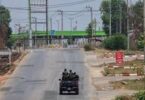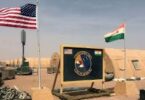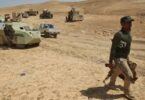ISTANBUL (AA): Historical figures, like Ibn Khaldun, can be used for two different purposes, said an academic on the sidelines of 5th International Ibn Khaldun Symposium in Istanbul.
“First, to cement power of authority and second, to use historical thinkers to really find some different ways to evaluate the present,” said Prasenjit Puara, who is a Professor at Duke University, U.S.
Istanbul-based Ibn Haldun University is hosting a two-day international conference on 14th century Arab scholar Ibn Khaldun’s view on power, economics and morality which kicked off on Saturday.
The academic of Indian decent Puara said that someone like Ibn Khaldun “is very important to understand the ways in which he understood society are actually related to our ways but he had a different understanding of the society”.
Speakers from around the globe are attending the conference to discuss ideas of Ibn Khaldun on the accumulation of wealth and conspicuous consumption in corrupting the foundations of authority.
Ibn Khaldun is widely known for his scholarship on modern disciplines of historiography, sociology, economics, and demography. His most famous work is Prolegomena (Muqaddimah) which records the early view of universal history.
“So, it is very important to recover those understandings,” Puara added.
He said that people “without fully understanding Ibn Khaldun’s background and knowledge and his goals have tended to isolate certain things that fit with contemporary social sciences without understanding the cosmology and cosmological ideas that are necessary to it”.
“There are some very important repetitive cultural tendencies to bring up resistance and it is often based on transcendental idea which may not be the idea of God…,” he said.
The Duke University professor confided that the Islamic society has a “better notion of financial regulation and of recognition that there has to be stops upon pure economics, to consume”.
“The idea of [Islamic] regulation [of economy] that there are social forces is an important lesson for the modern capitalist world to absorb into its executive and other areas,” he asserted.
Explaining the relevance of Ibn Khaldun in current times, Bruce Lawrence, who is a professor at Ibn Haldun University, said that there is a need to understand relation “between Deen [religion] and Duniya [world]”.
“It is not that they are opposites but they are both necessary because we are in this world because we want Duniya. And Deen gives us meaning. Religion is also orientation,” Lawrence said.
He said that Ibn Khaldun’s perspective to solve contemporary economic challenges would be “if you do not learn poverty, you do not learn the term”.
– Learn poverty
“One has to learn poverty because the problem is rich do not have any sense of time. They think time is money but in fact time is really for benefit of your own development,” he said.
The professor said that values have to be “centre [of the society] not the periphery”. “Then [comes] politics, [followed by] economics. Of course, economics is important but it is end in itself, economics is always instrumental.”
Mohamad Hammour, who teaches economics at the host university, said that the specific propositions put forward by Ibn Khaldun, “conceptual and civilizational understanding that he brought to the question of social science including politics and economics which has lot to do with third element that is morality”.
“Ibn Khaldun would potentially bring a perspective that is coming from pre-modern history in his case of Islamic world and this comparative perspective is very important,” Hammour said.
“Because without comparison, we take a lot of things as given,” he added.
He said that there was a need of comparison of “our modern world with other worlds, including Ibn Khaldun’s world and his analysis of the social issues allow us to understand our world today”.
“The more interesting thing if want to understand ourselves is to ask the question ‘why don’t we have what Ibn Khaldun was talking at his time’.”
His notion about governance, criteria for the merchant,” Hammour added.






